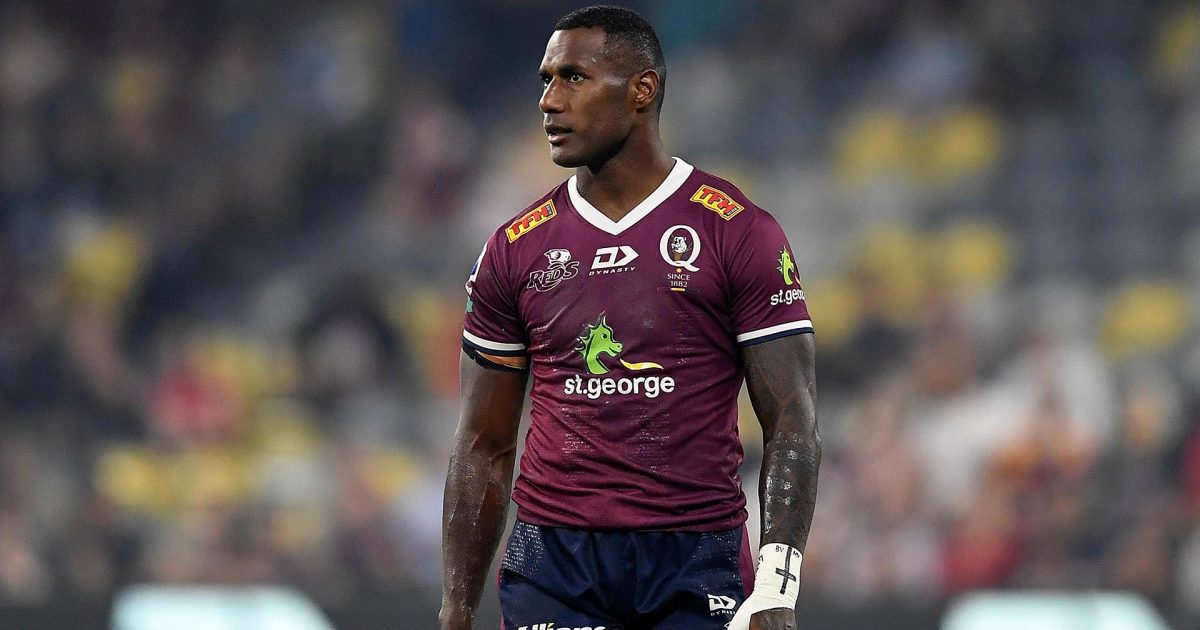Former NRL star Vunivalu falls further down Wallaby pecking order

Prior to their series against England, Wallabies captain James Slipper said that all NRL convert Suliasi Vunivalu needs is “time in the saddle” in order for the star winger to apply his X-factor at the international level. Yet the Queensland back was nowhere to be seen on Dave Rennie’s 44-man list for the Wallabies training camp this coming week.
The raw talent of the 27-year-old Vunivalu is evident but since joining the Queensland Reds in 2020, Vunivalu has struggled with health, specifically a hamstring injury that has kept him out of many Super Rugby contests.
Despite the lack of game time, the Fijian-born athlete was selected in the 35-man Wallaby squad in June. A selection that came with some criticism as Vunivalu’s inclusion meant players with more of a resume at the Super Rugby level – such as the recent breakout star Mark Nawaqanitawase – went unrewarded for their efforts.
A sense of irony can be found in Nawaqanitawase’s 2022 journey, where the 22-year-old profited from the game time he enjoyed with the Australia A side who played in the Pacific Nations Cup in July and then a three-match series in Japan.
Dave Rennie outlined exactly what the Wallabies were hoping to achieve with Vunivalu’s selection last June: “It’s not so much about capping Suli, we’ve picked him because he has massive potential, we think we can accelerate his development within the camp rather than leaving him outside of that.
“He’s had his troubles with injury, we’ve seen glimpses of real quality and we’re just keen to get our hands on him and accelerate that.”
That narrative was sounding less optimistic following the England series and Rugby Championship, where Vunivalu’s lone appearance lasted just five minutes.
“He needs to convince us at training around high speed and repeat speed,” Rennie said prior to the End of Year Tour, where Nawaqanitawase was ultimately selected ahead of Vunivalu.
“He’s certainly got some attributes that we know he’d excel at at this level, but it’s the whole package.
“When you look at people like, in the backfield, (Andrew) Kellaway and Tom Wright, Marika (Koroibete), they have got a massive work ethic. I’m not sure if everyone appreciates the work those guys do off the ball.”
Vunivalu’s initial two-year Super Rugby contract with an estimated worth of $700,000 concluded in 2022. But despite links to the NRL’s expansion franchise the Redcliffe Dolphins, the former two-time NRL champion opted to take up what is understood to be a significant pay cut on a one-year extension with the Queensland Reds, doubling down on his ambitions to don the green and gold at this year’s World Cup. The pay cut also eases what could be a hefty loss for Rugby Australia, as their master plan for recruiting the next Wallaby star winger has so far failed to fire.
Rennie alluded to the likes of Vunivalu when announcing his training camp squad earlier in the week.
“Of the 44 players, all bar two have worn the gold jersey over the past three years and there’s also several fringe players who still have an opportunity to force their way into the next camp through strong Super Rugby form.
“We’ll use the four days to make sure all players head back to their franchises with a clear understanding on what will give them the best chance of representing their country in a World Cup year.”
Should Vunivalu stay healthy, he undoubtedly has the game-breaking talent to claim a selection spot in the Wallabies’ competitive backline. Although with Rennie amongst others labelling left winger Marike Koroibete the best winger in the world, competition for the right flank promises to be ripe; Nawaqanitawase, Tom Wright, Jordan Petaia and Andrew Kellaway will all join Vunivalu in the tussle for minutes in France.
















